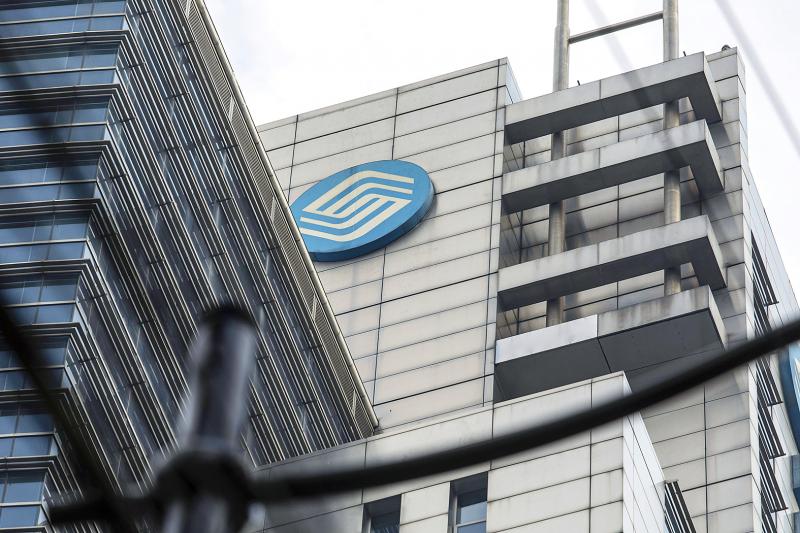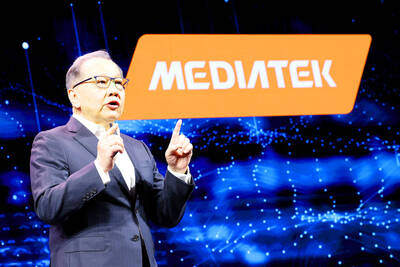China Mobile Ltd (中國移動), the country’s largest wireless carrier by revenue, is aiming to raise 48.7 billion yuan (US$7.64 billion) from its Shanghai listing in what would rank among the largest share offers for the nation’s domestic stock market in a decade.
The state-run company, which was removed from the New York Stock Exchange (NYSE) earlier this year due to an investment ban ordered by former US president Donald Trump, said that today it would issue 845.7 million shares at 57.58 yuan apiece, a company prospectus filed on Monday with the Shanghai bourse showed.
The proceeds that China Mobile is seeking to raise would rival that of Semiconductor Manufacturing International Corp’s (SMIC, 中芯) offer in Shanghai last year, making it among the top-10 listings on record in China, data compiled by Bloomberg showed.

Photo: Bloomberg
Assuming its over-allotment option is exercised in full, China Mobile would raise 56 billion yuan from the listing, the prospectus showed.
That would make it the world’s second-largest offering this year after electric pickup truck maker Rivian Automotive Inc’s US$13.7 billion initial public offering, Bloomberg data showed.
Companies listing in China raised nearly US$80 billion this year, up about 17 percent from last year.
The NYSE suspended trading in China Mobile in January, along with the Asian nation’s other major state-owned operators, China Telecom Corp (中國電信) and China Unicom Hong Kong Ltd (中國聯通).
That development followed an order barring US investments in Chinese companies the Trump administration said that there was a threat to national security.
China Telecom listed in Shanghai in August after raising more than US$7 billion.
China United Network Communications is already trading on the exchange.
Shen Meng (沈萌), director at Chanson & Co, a Beijing-based boutique investment bank, said China Mobile’s stock offer should be successful, as the Chinese government has prepared for it and there is ample capital in the domestic market to support such a deal.
“China Mobile is one of the state-owned telecom companies. Its earnings are better than the other two,” Shen said. “In the 5G age, China Mobile has more impact and competition. Under the tradition of China’s stock market, the institutional and individual investors will positively welcome China Mobile.”
China Mobile’s A-share offer would carry a price-to-earnings ratio of 12.02, based on its net income last year of 4.79 yuan per share, calculated according to its total share capital enlarged by the offer, the prospectus showed.
The company’s Hong Kong-listed shares fell 0.1 percent in trading yesterday.
Proceeds from the listing in the Chinese financial hub are to fund 5G network expansion, cloud infrastructure, smart-living projects and tech development that would cost the company 157 billion yuan in total, China Mobile has said.

Taiwanese suppliers to Taiwan Semiconductor Manufacturing Co. (TSMC, 台積電) are expected to follow the contract chipmaker’s step to invest in the US, but their relocation may be seven to eight years away, Minister of Economic Affairs J.W. Kuo (郭智輝) said yesterday. When asked by opposition Chinese Nationalist Party (KMT) Legislator Niu Hsu-ting (牛煦庭) in the legislature about growing concerns that TSMC’s huge investments in the US will prompt its suppliers to follow suit, Kuo said based on the chipmaker’s current limited production volume, it is unlikely to lead its supply chain to go there for now. “Unless TSMC completes its planned six

Intel Corp has named Tasha Chuang (莊蓓瑜) to lead Intel Taiwan in a bid to reinforce relations between the company and its Taiwanese partners. The appointment of Chuang as general manager for Intel Taiwan takes effect on Thursday, the firm said in a statement yesterday. Chuang is to lead her team in Taiwan to pursue product development and sales growth in an effort to reinforce the company’s ties with its partners and clients, Intel said. Chuang was previously in charge of managing Intel’s ties with leading Taiwanese PC brand Asustek Computer Inc (華碩), which included helping Asustek strengthen its global businesses, the company

Power supply and electronic components maker Delta Electronics Inc (台達電) yesterday said second-quarter revenue is expected to surpass the first quarter, which rose 30 percent year-on-year to NT$118.92 billion (US$3.71 billion). Revenue this quarter is likely to grow, as US clients have front-loaded orders ahead of US President Donald Trump’s planned tariffs on Taiwanese goods, Delta chairman Ping Cheng (鄭平) said at an earnings conference in Taipei, referring to the 90-day pause in tariff implementation Trump announced on April 9. While situations in the third and fourth quarters remain unclear, “We will not halt our long-term deployments and do not plan to

NOT OVERLY PESSIMISTIC: While consumer electronics demand remains volatile, MediaTek CEO Rick Tsai said that tariffs would have limited effect on the company Chip designer MediaTek Inc (聯發科) yesterday said revenue this quarter would contract by 4 percent sequentially in the worst-case scenario on softer smartphone demand. Revenue is expected to be between NT$147.2 billion and NT$159.4 billion (US$4.6 billion-US$4.98 billion), compared with NT$153.31 billion last quarter, the company said. MediaTek said demand for smartphone chips would be flat or slide sequentially this quarter, while demand for smart devices and power chips would go up. Mobile phone chips made up 56 percent of the company’s total revenue last quarter. Gross margin of 46 to 49 percent is forecast for this quarter, compared with 48.1 percent last